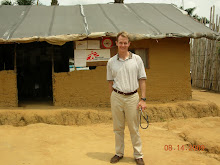
Photo: boy with "fish trap"
The ride from Lubutu to Mungele is through a series of small villages. Each is separated from its neighbor by 5 to 10 kilometers of dense jungle. As we leave the outskirts of Lubutu, we pass an area where several people are using one crutch to walk. One leg is small and positioned at an odd angle, unsuitable for weight bearing. For the next thirty minutes, there are no more one crutch walkers. Then a big clump of adults, adolescents, and children, using hand hewn wooden crutches appears. After a few kilometres of jungle is another village where people are again walking normally. What is this?
Poliomyelitis is caused by a virus, transmitted by the fecal-oral route. It is primarily a disease of children. Patients first develop a common cold- like illness (fever, headache, sore throat, drowsiness). In 2% of those infected the second, meningitic phase follows. Slightly over half of the children with meningitis go on to develop paralytic disease. This acute flaccid paralysis is usually in one leg.
When I was in medical training, I was told that soon polio would be only a medical memory, wiped out by vaccination. That did not happen. Polio is still endemic here in Congo, meaning that there is some disease almost every year. I have seen both young children and adults on one crutch and one normal leg. The paralyzed limb is smaller, as the nerves from the spinal cord leading to the limb have been killed by the infecting virus. Without nerve stimulation, the leg doesn't actually shrink, it simply doesn't grow normally.
There are two types of poliovirus vaccine. When I was training, OPV (oral poliovirus vaccine) was used. Children received a drop of pink liquid to swallow, containing millions of attenuated (weakened, but not killed) infecting virus particles. The weakened virus infected the child but produced no symptoms. The big advantage of oral vaccination was herd immunity. The vaccinated child excreted weakened poliovirus in their stool. Since children's fingers go everywhere, the vaccinated kids transmitted the weakened virus to everyone around them. The people in the surrounding area (the herd) become immunized secondary to contact with the child receiving the vaccination.
Attenuated live virus vaccine and its herd immunity was great. Unfortunately, even with weakened virus, some people got paralytic polio from the vaccine itself. Eventually, almost all cases of paralytic polio in the United States were due to vaccine. So a switch occurred. Now children in the US are immunized with an injected, killed polio vaccine. They cannot get disease from killed virus, but there is no herd immunity. Only the person receiving the injection is protected.
In Congo, children receive the oral vaccine, because here herd immunity remains important. I have been shocked at the low vaccination rates in the population we are serving. At birth children are issued a health record card. On the front is identifying information, in the middle a growth chart, and on the back is the vaccination schedule. Since my arrival, we have started dong weekly vaccination clinics at both Centres de Santé. Children in Congo are scheduled to receive oral poliovirus vaccine at birth, 6 weeks, 10 weeks, and 14 weeks. I am still searching to find a child who has a record of receiving all four doses. Without this vaccine, children get polio.

Photo: Boys on a pirogue, local way of crossing river
Why aren't people bringing their kids in for free vaccine? I did an unscientific survey by talking to my Congolese co-workers. They all listed parental ignorance of the necessity of vaccination as the most important factor. Parents in smaller villages may actively flee organized vaccine campaigns, fearing any kind or authority, governmental or otherwise. Years of war does that to people.
It's hard to know what is saddest about medical care here. Is it lack of resources that we have in the West? Or is it seeing people with conditions treatable in the West that must simply be tolerated because we are in Lubutu? My vote is for a disease like polio- a completely preventable condition with lifelong consequences.

No comments:
Post a Comment